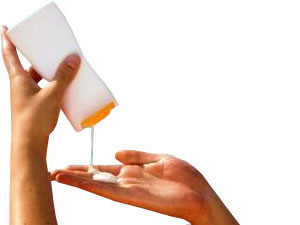There has been a lot in the media recently about the harmful effects UV rays on delicate kiddies’ skins. The issues around melanoma are well known, and today it’s rare to see an unprotected skin on any beach. Sunscreens are being applied by the tube-load every day – but the bad news is, excess washed-off sunscreen could be killing corals. By Jeremy Torr and Andy Bruckner.
Singapore, 11 February 2019. Sunscreen lotions are without doubt saving lives around the world as we flock in ever increasing numbers to beaches for our holidays. But sadly, commercially marketed sunscreens contain a number of chemicals that have been found to be toxic to corals and their larvae, even at very low concentrations.
Snorkelling with sunscreen takes chemicals right to the heart of the reef. Courtesy Florida Keys
This probably wouldn’t be a problem given that the sea dilutes many other, way more poisonous, chemicals in its trillions of litres of water, but – bad luck for corals – most reef visitors wear sunscreen right next to the delicate, living organisms.
And worse, the daily dose of sunscreen at the water’s edge is now estimated to be just under 40 tonnes of chemicals potentially washing into the sea every day. Or up to 14,000 tonnes a year, almost doubled from 1998.
Toxic for some
Of all the commonly used ingredients in sunscreen, oxybenzone (C14H12O3) is of the most concern. A pale-yellow solid, it is readily soluble in most organic solvents and belongs to the class of aromatic ketones known as benzophenones. As the most common ultraviolet (UV) blocking chemical in sunscreen, it is a real problem for corals.
As the Coral Reef CPR Group reports, scientists have found that oxybenzone concentrations that are seemingly undetectable - as low as 62 parts per trillion - can cause a variety of pathologies to corals. This chemical can induce coral bleaching by lowering the temperature at which corals first become stressed. It also triggers damage to coral DNA, can induce lethal deformities, and it can cause a coral planula (larvae) to encase themselves in a skeleton, at a time in its development when it shouldn't even produce any skeletal material.
Researchers are continually monitoring reefs around the world. Courtesy Coral Reef CPR.
What's most scary is that researchers also suggest that other chemicals in sunscreen, including methoxycinnamate (C18H26O3), camphors and even certain forms of zinc oxide and titanium oxide – especially in nano-bead form - can be toxic to corals, fish and other reef organisms. According to their studies, even some sunscreens that are certified as organic may not be entirely safe, as certain plant-based oils found in some brands of sunscreen - such as neem, eucalyptus and lavender oils - are also used as insecticides. Another component, beeswax, may be relatively harmless in a pure form, although it may be contaminated with industrial fungicides and insecticides.
Obviously, the reefs that are most contaminated by the chemicals found in sunscreens are those that have the largest numbers of swimmers and snorkelers – which are equally obviously those in high tourism areas, because they have beautiful and attractive reef ecosystems. It’s a vicious circle.
The chemicals in sunscreen can enter the water in other ways as well. Certain sunscreen ingredients, such as oxybenzone, are absorbed through the skin and can be detected in urine within 30 minutes. Besides flushing through the toilet, sunscreen chemicals wash off your body when you shower, entering the sewer system and possibly being eventually discharged into the sea near a reef.
What to do
While this information might be a shock, it's important to keep it in perspective.
Alison Teal tells swimmers how to minimise toxic sunscreen damage.
Sunscreen pollution is a much lower threat to reefs compared to more egregious direct human impacts such as over- or destructive fishing, land-based pollution from runoff, sewage and industrial discharges, and increasing sea water temperatures and acidification due to climate change.
So if we can cut down on the use of sunscreens containing oxybenzone and other known harmful ingredients, and opt for mineral-based sunscreens instead, we can hopefully protect ourselves (and kids) from sunburn while keeping environmentally friendly. Look for sunscreens containing mainly minerals (but not with micro beads), with no Vitamin A, no parabens, and not spray-on, that block both UVA and UVB rays. Check out the guide at Haereticus Lab website for more info.
And governments are on it too. The problem has become sufficiently pressing that US states like Hawaii and Key West, Florida have banned the sale of sunscreens containing oxybenzone and UV-B absorber octinoxate, as has Pacific island nation Palau.
Reading the ingredients in sunscreen is a must for sustainable swimmers. Courtesy BOCG.
The Swedish government-backed International Coral Reef Initiative is also pushing to educate governments, reef managers, divers, snorkelers and swimmers as well as the tourism and pharmaceutical industries about the dangers of sunscreens for reef colonies.
But we can make a difference too. At a personal level, we can reduce the amount of sunscreen that possibly ends up on a reef by applying it well before we go into the water, instead of immediately before swimming or snorkeling. Remember it’s about protecting yourself from the sun, not just looking shiny or bronzed!
If you are looking for the ultimate UV protection, you can dramatically reduce the amount of sunscreen needed by covering up with a rash guard, wetsuit skin or other sun clothes designed to reduce UV exposure. That way, you can get close up to the coral without risking maiming them for the next lot of underwater visitors.
And unlike sunscreen, they don’t wash off - so you won’t get burned, even on a long day out.


